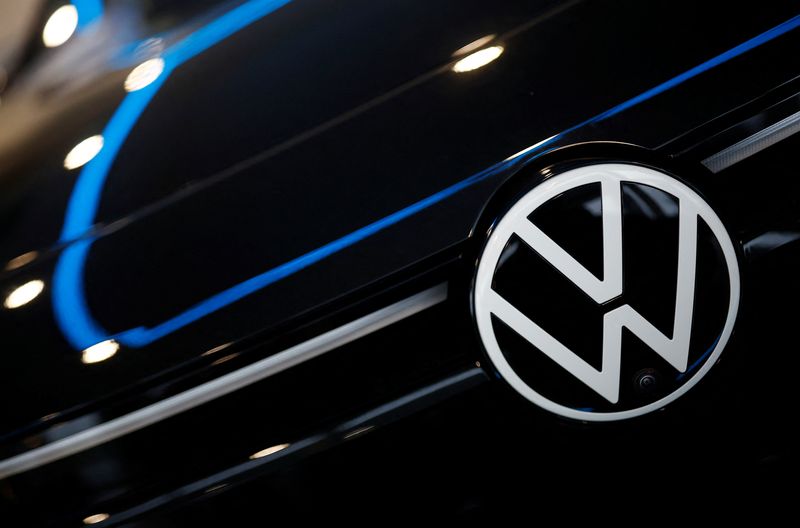By Abhirup Roy and Ben Klayman
SAN FRANCISCO (Reuters) -German automaker Volkswagen Group will invest up to $5 billion in U.S. electric-vehicle maker Rivian as part of a new, equally controlled joint venture to share EV architecture and software, the companies said on Tuesday.
Shares of Rivian surged about 50% in extended trade after the announcement, potentially supercharging the company’s market value by nearly $6 billion, if gains hold on Wednesday.
The auto industry faces a crucial time as EV startups grapple with a slowdown in demand amid high interest rates and dwindling cash, while traditional automakers struggle to build battery-powered vehicles and advanced software.
The investment will provide Rivian the funding necessary to develop its less expensive and smaller R2 SUVs that are set to roll out in early 2026 and its planned R3 crossovers, CEO RJ Scaringe told Reuters. Moreover, the partnership will enable Rivian to cut operating costs by leveraging volumes of supplies including chips and components, he said.
It will also help Rivian, known for its flagship R1S SUVs and R1T pickups, turn cashflow positive. The company will license its existing intellectual property to the JV, and the R2 will be the first vehicle using software from the JV. Volkswagen vehicles, including its Audi, Porsche, Lamborghini and Bentley brands, will follow.
“Any cash infusion like that is huge. Getting the support of Volkswagen Group certainly really strengthens their story toward Europe and toward Asia eventually,” said Vitaly Golomb, managing partner at Mavka Capital, a Rivian investor.
For Volkswagen, analysts and investors see the investment as a move to solve the company’s software struggles. VW’s software division, Cariad – set up under former VW Group CEO Herbert Diess – has exceeded its budget and failed to meet goals. That contributed to Diess’ exit in September 2022.
Volkswagen will immediately invest $1 billion in Rivian through a note that will convert to stock on Dec. 1, subject to regulatory approvals. Volkswagen will also make a $1 billion payment at the inception of the JV, expected in the fourth quarter of this year.
The German automaker will also invest $2 billion in Rivian stock – $1 billion each in 2025 and 2026 – subject to the startup hitting certain milestones, and provide a $1 billion loan in 2026.
COST CUTS
Even with losses of nearly $40,000 for every vehicle it delivers, Rivian has been on a steadier footing than other EV startups that have been forced to slash prices or file for bankruptcy, including Fisker earlier this month.
To keep its head above water, Rivian has been slashing costs even as it works to deliver its EVs on time. It has also been renegotiating supplier contracts and building some parts in-house.
The company has overhauled its manufacturing process, which has led to a significant reduction in cost of materials, Scaringe told Reuters last week.
Rivian’s cash and short-term investments fell by about $1.5 billion in the first quarter to just under $8 billion. Before the VW deal, Rivian had said it had enough capital to launch the R2 SUVs.
“They were definitely going to need something to get them past the launch of the R2s. This definitely helps extend that range,” said Sam Fiorani, vice president at research firm AutoForecast Solutions.
Rivian stock has halved so far this year. Traders have bet heavily that the stock will fall, with an equivalent of 18% of its shares recently sold short, according to data from S3 Partners.
LEGACY
Volkswagen said earlier this year it was sticking with plans to launch 25 EV models in North America across its group brands by 2030, even as it acknowledged slowing growth in the segment. The company’s shares are down around 3% so far this year.
Mavka Capital’s Golomb said VW is not a big player in the large SUV and pickup segments in the U.S. and it has failed to break through with its crossover electric SUV ID4. But the partnership with Rivian gives the company options, he said.
Volkswagen said on Tuesday the Rivian software will also be used by the German carmaker’s off-road EV brand Scout, which is building a plant in South Carolina to assemble pickups and SUVs that would compete with Rivian. The plant is scheduled to open in late 2026.
VW’s Cariad has been struggling for years. Analysts say parts of its legacy system come from suppliers, which makes integrating all the different pieces complicated. Problems at the unit delayed work on important new vehicle models Porsche e-Macan and Audi Q6 e-tron.
Volkswagen has launched a new software architecture but cars made using that technology will only hit the market in 2028.
Still, VW said Cariad will play a central role in scaling up software that is used across the brands.
(Reporting by Abhirup Roy in San Francisco and Ben Klayman in Detroit; Additional reporting by Noel Randewich in Oakland, California, Christina Amann in Berlin, Harshita Varghese in Bengaluru Writing by Sayantani GhoshEditing by Rod Nickel, Matthew Lewis and Leslie Adler)
#Volkswagens #billion #investment #Rivian #boosts #makers #shares,
#Volkswagens #billion #investment #Rivian #boosts #makers #shares
